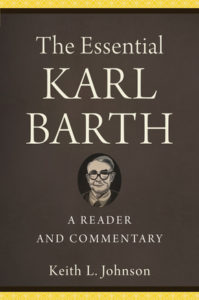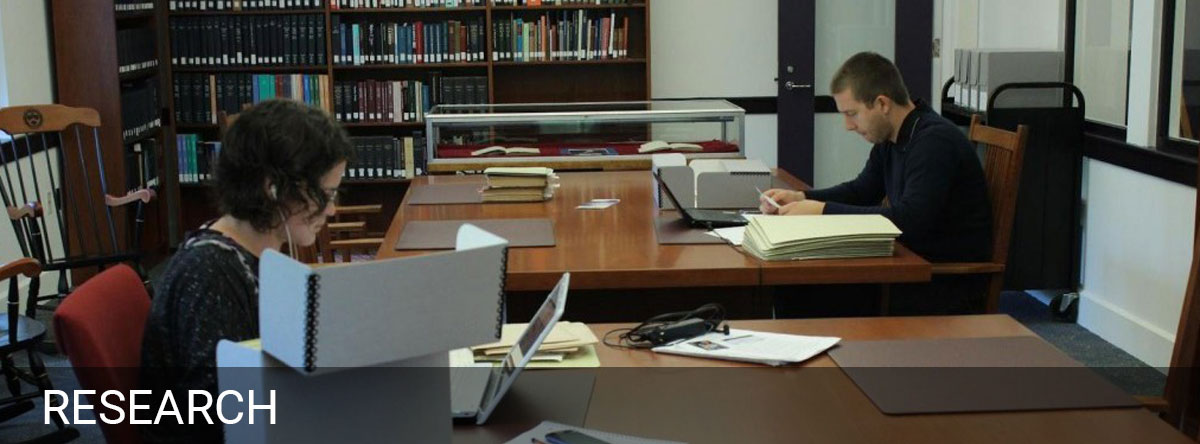 Keith L. Johnson, The Essential Karl Barth: A Reader and a Commentary (Grand Rapids, MI: Baker Academic, 2019), 384 pp. $40.00 (hardback).
Keith L. Johnson, The Essential Karl Barth: A Reader and a Commentary (Grand Rapids, MI: Baker Academic, 2019), 384 pp. $40.00 (hardback).
Reviewed by Christophe Chalamet (December 21, 2020).
What, given the breadth of Karl Barth’s œuvre, belongs to his most “essential” writings? Keith Johnson gives us his answer in this volume, which comprises three parts, each preceded by an introduction: “Barth’s Theological Development” (13-101), Barth’s “Church Dogmatics” (103-300), and “Barth’s Political Engagement” (301-345). The volume opens with a brief but very helpful and comprehensive survey of Barth’s life (1-12), followed by an introduction to the first part of the book.
The first selected text is drawn from the first chapter of Barth’s Römerbrief, in its 2nd edition (1922). Of course, this may give the impression to some that Barth did not write much of value before then, which is slightly unfortunate, especially given the significance of the first edition of his commentary (completed four years earlier in 1918) as well as of even earlier writings, some of which have only been recently published in the German edition of Barth’s complete works (Gesamtausgabe). It would have been very good to translate some pages from the first edition (which remains untranslated in any language, as far as I can see). But the purpose of the book is to introduce readers to Barth’s œuvre, and so Johnson’s decision is understandable. The decision to include excerpts from the very first chapter of Barth’s commentary is sound: right away, with this first selection, the reader is placed before a text on “Jesus Christ our Lord” (24-27). But one then misses some of the powerful hermeneutical insights that are found in the well-known (and highly significant) preface to this 2nd edition. It goes without saying that limiting the selections from Romans to certain pages from its first chapter means leaving out some pathbreaking insights found in later chapters of the commentary. But it was simply impossible not to leave important things out.
The Göttingen dogmatic lectures are included with a short (a little over 4 pages) but well-selected section in which Barth speaks of Deux dixit – “God has spoken” – indeed a key theme in his first dogmatic lectures, not only as “the usual perfect” but as “an eternal perfect” (66-67).
Readers of Barth’s works can easily consult most of the texts that are included in this volume. But there are a few exceptions, which are worth signaling. Most significantly, there is Barth’s “Farewell” (Abschied) to Zwischen den Zeiten, the journal he had co-founded with Eduard Thurneysen, Friedrich Gogarten, and Georg Merz in 1922. This text, written on October 18, 1933, is now available in English for the first time, in Matthew J. Aragon Bruce’s translation (82-92). The next selection, after this text from 1933, comes from Barth’s important lecture on “The Humanity of God.” This is a big jump in chronology, from 1933 to 1956, but one that can be explained by the fact that, during these two decades, Barth was working on his Church Dogmatics. And some other texts bridge this big gap in the third and final part of the book, titled “Barth’s Political Engagement.”
Part 2 comprises 19 brief excerpts from Barth’s Church Dogmatics (CD) with an emphasis on CD I/1 with four excerpts (compared to only one excerpt from CD I/2), and then one or two excerpts from the remaining volumes of CD (notably with three excerpts from II/2). In two hundred pages, one is thus presented with key sections from the CD and its 8,000 pages or so. The introduction to part 2 (103-107) will be extremely useful to students. The selections have been made very carefully and wisely. One notices an emphasis on the themes of “The Knowledge of God” (chap. 16; 17 pages, whereas other chapters are two to three times shorter), a text which is presented as “one of the most important passages in Barth’s writings” (149), on “The Doctrine of Election” (chap. 18; 15 pages), as well as on “The Obedience of the Son of God” (chap. 25; 17 pages). The introduction to chap. 19, “The Election of Jesus Christ,” strangely fails to mention the departure that Barth’s treatment of this theme represents, in critical dialogue with earlier presentations in the Reformed and in the Christian tradition (but see 350 for comments on this in the conclusion).
Part 3, on “Barth’s Political Engagement,” focuses on the period of the Second World War and the years leading up to it. Two minor quibbles: It would have been useful to mention that Barth was not just a Swiss citizen (303), as he also became a German citizen in 1926 after moving to the University of Münster. It would also have been good to include material from texts he wrote in 1914-1915 since these years amount to the most significant turn he experienced in his life as a theologian (however, see Keith Johnson’s helpful comments in the conclusion). One finds instead, and very usefully, a brief retrospective reflection on the 1920s (written in 1962 and made available in English here for the first time, in Matthew J. Aragon Bruce’s translation; some parts of the text are not clear to me: “The ‘Youth-movement’ called, and they gave themselves in those years” [305]; what does this mean?), an Advent sermon from December 1933 (chap. 31), the Barmen Declaration (chap. 32), a letter to American Christians from December 1942 (chap. 33), and, finally, excerpts from Barth’s lecture from 1946 on “The Christian Community and the Civil Community” (or, as Keith L. Johnson prefers, see 338n2: “The Community of Christians and the Community of Citizens”) (chap. 34).
The book closes with a conclusion titled “The Tradition of Karl Barth” (347-365). Students will find these pages very useful. It is nice to see Barth’s lecture on humanism, given at the ‘Rencontres internationales’ in Geneva in 1949, a text seldom quoted even by Barth specialists, feature so prominently at the close of the book (361-363; this text is particularly interesting in that it announces the 1956 theme of “The Humanity of God,” in my opinion). One small question: with the two editions of his commentary on Romans, did Barth really arrive “on the scene as a prophetic voice from the wilderness, […] descending from the Swiss mountains with a message of judgment for a century-old tradition of academic theology” (347)? The rhetoric is nice, but the fact is that if, around 1918, one had asked some of the most significant figures in German academic theology if they had heard of this Swiss pastor, many would have answered that indeed they knew him personally. Scholars such as Adolf von Harnack, Wilhelm Herrmann, Ernst Troeltsch, Johannes Weiss, Adolf Schlatter, Martin Rade, Adolf Jülicher, Theodor Häring, Hermann Kutter, and Leonhard Ragaz all knew Barth personally (Troeltsch and Häring exchanged letters with him in April 1912). Barth was not an unknown, smelly, bearded prophet who came out of nowhere with a bang! He was a young theologian of obvious promise, who had published several pieces in some of the most respected theological journals in his day.
Did Barth see himself “as a theologian without a tradition” (364)? Here too, I am not so sure. He saw himself as a Reformed theologian, and so as a participant in one precise tradition – which does not mean of course that he could appropriate all aspects from this tradition. It seems to me that he constructed his own tradition, with the kind of eclectic approach that Keith Johnson rightly points out (349, 351).
One very small detail: In the conclusion, a quote from Barth’s 1933 “Farewell” (“Abschied”) refers readers to the German edition in the Gestamtausgabe (353n12), without referring to the presence of this text in the book itself, on page 86.
Keith Johnson’s own expertise on the question of natural theology and on the (exclusive) source of knowledge of God in God’s actual, living Word, certainly determined in part the choice of texts that made it into the book, both with regard to content and quantity, as well as some of the topics that are emphasized in his conclusion (e.g. the dialogue with Hans Urs von Balthasar; see 356-359). I do not find this regrettable at all, because these interests are indeed central to Karl Barth’s theology, and it gives a certain sharpness or angle to the volume. Students of theology will be very grateful that such a book exists. There is no doubt that this resource will greatly profit anyone who wishes to begin, or to continue, to read Barth.
Christophe Chalamet, Associate Professor of Systematic Theology, University of Geneva
The views expressed here are strictly those of the author; they do not necessarily represent the views of the Center for Barth Studies or Princeton Theological Seminary.


